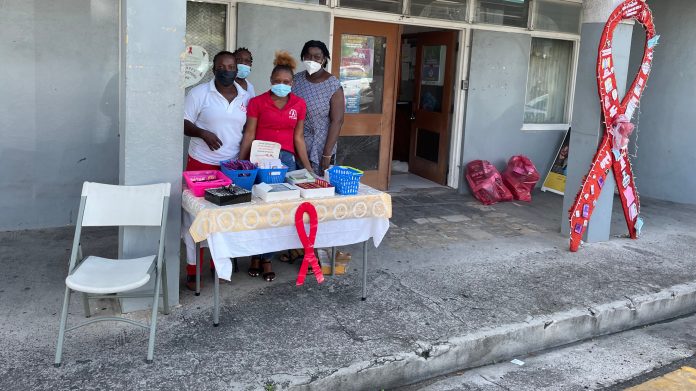
By Makeida Antonio
The AIDS Secretariat has upped calls for residents to know their HIV status by getting tested, even as the Covid-19 pandemic continues to dominate the global health conversation.
National AIDS Programme Manager Delcora Williams gave Observer some revelations into the Secretariat’s current operations and statistics during an interview yesterday on site at its Long Street location to mark World AIDS Day.
According to Williams, the risk of contracting HIV has not been reduced even though people’s freedom of movement has been somewhat restricted due to the pandemic.
“Covid is there, people are staying home more, causing you to find something to occupy yourself so you have sex. We want you to know that HIV is still here,” she said.
In order for the AIDS Secretariat to have an accurate figure of how many people in Antigua and Barbuda are currently living with HIV/AIDS, the National Programme Manager has urged residents to take control of their health and know their status.
She believes that the current figures recorded could be underreported. Official figures suggest there are around 900 people living with HIV in Antigua and Barbuda but Williams suspects the real figure is significantly higher.
“There are also persons out there who know they are HIV positive doing nothing about it so sometimes we say times three,” Williams explained.
She also took the time to respond to several pertinent questions about HIV and ascertaining one’s status.
How do I get tested for HIV?
Williams: “Because of Covid what we do now is do it by appointments. You can come in the day before or you can call on the phone – our numbers are 462-5975 or 462-5039.”
Free testing sites over the next few days include the AIDS Secretariat on the corner of Long and Temple streets from 8.30am-5pm Thursday and Friday. You can also get tested on Saturday at Rotary Club House in Factory Road from 9.30am-3pm, and at the Red Cross on Old Parham Road from 9am-4pm on December 8.
What happens when I make my appointment?
Williams: “We ask you for an ID. A counsellor will talk to you about what you are doing to put yourself at risk. Then they do the test. During the test, which takes about 15 minutes, the counsellor explains the process on what you can do to prevent your risk of contracting HIV. The whole thing is not just knowing your status but educating you from ever testing positive for HIV.”
Why is World AIDS Day important?
Williams: “Days like this are important because it allows the person to know their HIV status. It also allows them to know their partner’s status.” She explained that out of around 1,300 people officially recorded as having HIV in Antigua and Barbuda, there had been around 400 deaths, leaving approximately 900 persons known to be living with HIV in the country. Many of the deaths, she explained, date back to before modern treatment was readily available.
Do I have to pay for treatment if I test positive?
Williams: “Care and treatment are free and available. We see that the number of people dying has decreased over the years. We are glad for that; we want persons to know that treatment is free. It is the only illness that the government pays the full cost.”
Why is it important to know your HIV status?
Williams: “We want 90% of people to know their status. We want them to be in care and virally suppressed. If you’re positive, come and receive care so you can be virally suppressed and live longer.”
How do I remain HIV negative?
Williams: “For those of you who test negative your whole aim is to remain negative for life. In order for you to do that you have to make sure that you protect yourself and only have sex with a partner you know is HIV negative.”
The AIDS Secretariat has the pre-exposure prophylaxis (PrEP) drug available so that in the event someone has an HIV positive partner, they can take it to avoid contracting the virus during sexual intercourse.
What do the regional stats tell us?
According to WHO and UNAIDS estimates, 2.4 million people are living with HIV in Latin America and the Caribbean. Eighty-one percent of them have been diagnosed. Of those, 65 percent have received treatment and 60 percent had a suppressed viral load.
Meanwhile, AIDS deaths fell 27 percent since 2010 and the percentage of people with HIV who got their diagnosis late dropped from 33 percent in 2016 to 25 percent last year.
“To end AIDS by 2030, we must urgently end the economic, social, cultural and legal inequalities that drive AIDS and other pandemics in our region,” said Alejandra Corao, UNAIDS Acting Regional Director for Latin America and the Caribbean.
“While there is a perception that a period of crisis is not the most appropriate time to prioritise addressing underlying social injustices, it is clear that until this one is resolved, we must redouble our efforts in order to overcome the crisis,” Corao added.
